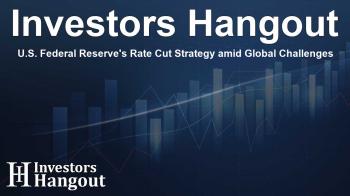U.S. Federal Reserve's Rate Cut Strategy amid Global Challenges

U.S. Federal Reserve's Interest Rate Outlook
According to commentary from financial expert Louis Navellier, the U.S. Federal Reserve is likely to persist in reducing key interest rates, largely due to ongoing challenges in the labor market. Recent data from ADP indicated that a mere 122,000 private payroll jobs were created, significantly falling short of the anticipated 139,000. This marks the smallest employment increase since previous months.
Fed's Vision for Inflation and Employment
Fed Governor Christopher Waller has conveyed optimism that inflation will ease towards the Fed's 2% target. He supports potential interest rate reductions, emphasizing that any decisions will hinge on forthcoming economic data. At a recent OECD event in Paris, Waller noted the importance of balancing inflation control with maintaining a stable labor market.
Challenges in the Eurozone Economy
The economic landscape in the Eurozone is becoming increasingly concerning. Data shows that Germany's factory orders plummeted by 5.4%, and a decline in the eurozone's economic sentiment index indicates a drop from 95.6 to 93.7. In France, growing anxieties over layoffs have led to a decrease in consumer sentiment, which fell from 90 to 89.
Inflation and Interest Rates in Europe
With weak currencies undermining economic stability, consumer inflation within the Eurozone surged to an annual rate of 2.4%, exceeding the ECB's 2% inflation target. Despite the recessionary climate, predictions suggest that the European Central Bank will embark on further interest rate cuts, with estimates ranging from four to five reductions expected into 2025.
Global Developments Influencing Markets
On the global scale, British Prime Minister Keir Starmer and his Energy Secretary have decided to halt new licenses for major energy companies intending to expand exploration in the North Sea. This policy shift has significant implications, particularly for Scotland, where it has ignited renewed calls for independence from overarching UK governmental policies.
Geopolitical Tensions and Economic Aid
Compounding these concerns is the appointment of Lord Peter Mandelson as the new British ambassador to the U.S. His prior criticisms of Donald Trump have led to him being dubbed the “Prince of Darkness” in British media. A major point of contention is Ukraine's recent decision not to renew transit fees with Russia for natural gas transport. This situation jeopardizes approximately one billion dollars in annual revenue for Ukraine, potentially intensifying the nation's need for international aid.
The Strength of the U.S. Dollar
As many economies face challenges or slide into recessions, the U.S. dollar maintains a robust position. Predictions suggest that the euro might fall below the U.S. dollar soon, with the British pound potentially declining to 1.15 against it this year. A stronger U.S. dollar poses a challenge for multinational companies, particularly those within the S&P 500, where nearly half of their income is derived internationally. Conversely, this environment tends to favor domestic stocks, particularly companies of small to mid-capitalization, allowing them to thrive.
Frequently Asked Questions
What are the expectations for U.S. interest rates?
The expectation is that the Federal Reserve will continue to lower interest rates in response to a sluggish labor market.
How is the Eurozone economy performing?
The Eurozone economy is facing significant challenges, including a recession and declining economic sentiment.
Why is the U.S. dollar strengthening?
The strength of the U.S. dollar is attributed to the economic struggles many other countries are currently experiencing.
What impact will the strong U.S. dollar have on multinationals?
A strong U.S. dollar might hinder the sales of multinational companies that earn significant revenue from overseas markets.
What are the implications of Lord Mandelson's appointment?
His appointment could influence U.S.-U.K. relations, especially given his known critiques of former President Trump.
About Investors Hangout
Investors Hangout is a leading online stock forum for financial discussion and learning, offering a wide range of free tools and resources. It draws in traders of all levels, who exchange market knowledge, investigate trading tactics, and keep an eye on industry developments in real time. Featuring financial articles, stock message boards, quotes, charts, company profiles, and live news updates. Through cooperative learning and a wealth of informational resources, it helps users from novices creating their first portfolios to experts honing their techniques. Join Investors Hangout today: https://investorshangout.com/
Disclaimer: The content of this article is solely for general informational purposes only; it does not represent legal, financial, or investment advice. Investors Hangout does not offer financial advice; the author is not a licensed financial advisor. Consult a qualified advisor before making any financial or investment decisions based on this article. The author's interpretation of publicly available data presented here; as a result, they should not be taken as advice to purchase, sell, or hold any securities mentioned or any other investments. If any of the material offered here is inaccurate, please contact us for corrections.
